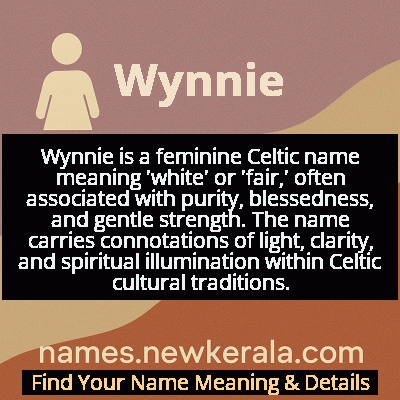Wynnie Name Meaning & Details
Origin, Popularity, Numerology Analysis & Name Meaning of Wynnie
Discover the origin, meaning, and cultural significance of the name WYNNIE. Delve into its historical roots and explore the lasting impact it has had on communities and traditions.
Name
Wynnie
Gender
Female
Origin
Celtic
Lucky Number
9
Meaning of the Name - Wynnie
Wynnie is a feminine Celtic name meaning 'white' or 'fair,' often associated with purity, blessedness, and gentle strength. The name carries connotations of light, clarity, and spiritual illumination within Celtic cultural traditions.
Wynnie - Complete Numerology Analysis
Your Numerology Number
Based on Pythagorean Numerology System
Ruling Planet
Mars
Positive Nature
Generous, passionate, energetic, and humanitarian.
Negative Traits
Impulsive, impatient, moody, and can be overly emotional.
Lucky Colours
Red, maroon, scarlet.
Lucky Days
Tuesday.
Lucky Stones
Red coral, garnet.
Harmony Numbers
1, 2, 3, 6.
Best Suited Professions
Military, sports, philanthropy, leadership roles.
What People Like About You
Courage, energy, leadership, generosity.
Famous People Named Wynnie
Wynnie Lee
Environmental Scientist
Pioneered sustainable water purification methods in developing regions
Wynnie Myerson
Children's Author
Wrote award-winning picture books promoting cultural diversity and inclusion
Wynnie O'Connell
Traditional Musician
Preserved and modernized Celtic folk music traditions through international performances
Name Variations & International Equivalents
Click on blue names to explore their detailed meanings. Gray names with will be available soon.
Cultural & Historical Significance
Throughout Celtic history, names meaning 'white' or 'fair' were not merely descriptive but carried spiritual significance, often linked to concepts of illumination, wisdom, and divine favor in Celtic mythology and folklore. The name connects to broader Indo-European traditions where light-colored attributes symbolized connection to the divine, as seen in figures like the Welsh goddess Gwenhwyfar (Guinevere) whose name shares the same root meaning 'white phantom' or 'white fairy.' This cultural legacy makes Wynnie more than just a name—it's a linguistic artifact preserving ancient Celtic worldviews about beauty, virtue, and spiritual purity.
Extended Personality Analysis
Individuals named Wynnie are often perceived as gentle yet resilient, combining the softness suggested by the name's sound with the inner strength derived from its Celtic heritage. They typically exhibit strong intuitive abilities and emotional intelligence, making them excellent mediators and compassionate friends. The name's association with fairness extends beyond physical description to character - Wynnie's are often known for their strong sense of justice and balanced perspective in conflicts. Their creative nature frequently manifests in artistic pursuits or innovative problem-solving approaches.
While they may appear delicate initially, they possess a core of Celtic fortitude that allows them to navigate challenges with grace and determination. This combination of sensitivity and strength makes them particularly effective in caregiving professions, education, and creative fields where both empathy and resilience are valuable. The name's musical quality and Celtic origins often correlate with artistic talent and a deep appreciation for nature, tradition, and beauty in all its forms. Wynnie's tend to be peacemakers who value harmony but aren't afraid to stand up for their principles when necessary, embodying the Celtic ideal of strength through gentleness.
Modern Usage & Popularity
In contemporary times, Wynnie has experienced a resurgence as part of the Celtic name revival movement, particularly among families seeking unique yet culturally rich names. While not ranking among the top 1000 names in most English-speaking countries, it has gained steady popularity in regions with strong Celtic heritage like Wales, Cornwall, and parts of Ireland. The name appeals to modern parents who appreciate its gentle sound, feminist connotations of strength and fairness, and connection to nature through its 'white' meaning often associated with purity and new beginnings. Social media and literary references have contributed to its growing visibility, positioning it as a distinctive alternative to more common Celtic names like Gwen or Fiona. Its usage reflects broader trends toward unique but meaningful names that honor cultural heritage while fitting contemporary naming patterns.
Symbolic & Spiritual Meanings
Symbolically, Wynnie represents purity, new beginnings, and balanced wisdom. The 'white' meaning connects to concepts of clarity, truth, and spiritual illumination across various cultural traditions. In Celtic symbolism, white is associated with the Otherworld, spiritual insight, and the quality of being 'blessed' or touched by divine favor. The name also carries metaphorical significance as a bridge between tradition and modernity, embodying both ancient Celtic values and contemporary ideals of fairness and equality. Like the first light of dawn or fresh snow, Wynnie symbolizes clean slates, untarnished potential, and the quiet strength found in purity of purpose. These symbolic layers make the name particularly meaningful for families valuing both cultural heritage and forward-looking optimism, representing hope, clarity, and the enduring power of light over darkness.

